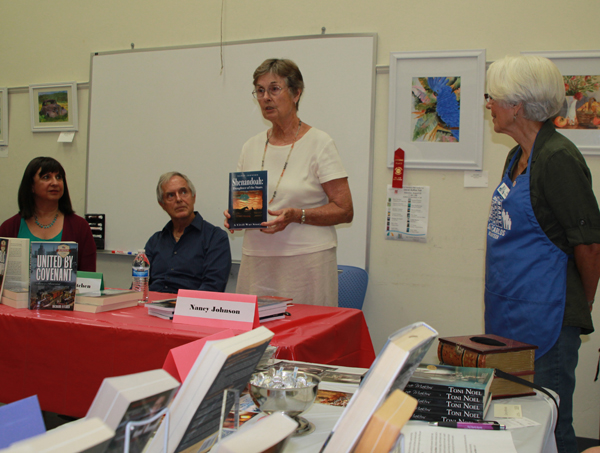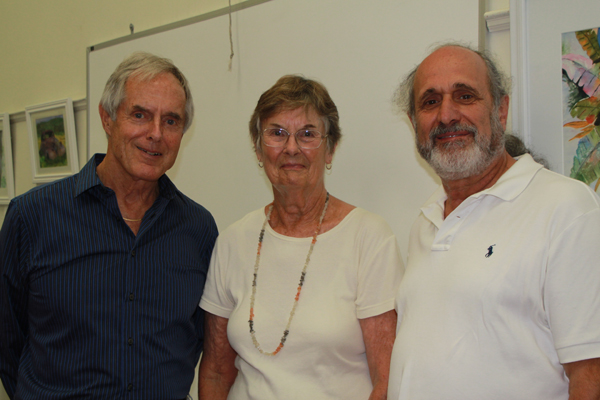L.C. Scott is the founder of eFrog Press and an author. Her many years of teaching at the high school and university level and her freelance writing career have prepared her to lead a team of experts to guide both fledgling and experienced authors through the maze of indie publishing. Today on Take the Leap she advises new authors on preparations for their first public speaking event about their new book.
Congratulations! You have been invited to an author event at your local library. You have two minutes to speak and then you can sell and sign books. Simple, right? Let’s look deeper.
Two-Minute Talk
Sounds easy but think of it this way—you only have two minutes to interest your audience in coming over to look at (and buy) your book.
You need to hook them and reel them in. Prepare. Read your book blurb. Think about what would interest these people. Then practice speaking aloud and time yourself. Critical!

Nancy Johnson talks about her new Civil War book, Shenandoah Daughter of the Stars
At the San Carlos Library’s 40th birthday celebration in August, I was invited to be part of their Author’s Fair with 13 other authors. I rehearsed my two-minute speech several times until I could fit my comments into the time frame and interest the audience. I was surprised when my first attempt at home was over six minutes!
Nancy Johnson, author of Shenandoah, started her two minutes with a funny story about why she started to write. The audience chuckled and she had their attention as she shifted to talk about her civil war stories for young people.
Don’t Give Away the Plot
When drafting your remarks, don’t give away the plot! I once heard an enticing summary of a book but the author revealed a key plot point. I bought her book and savored her writing, but my reading experience was tainted by knowing what would not happen. Sigh.
Time Flies so Keep it Short
Less is more when you’re speaking to an audience as part of a panel. Many in the room are not there to hear what you have to say. They may be there because their Aunt Martha just published her first book, but that doesn’t mean they won’t decide to buy your book if you give them a reason to. So keep it brief and try to win them over.
Do not exceed your time. Trust me, less really is more. With 14 authors, the audience didn’t have the patience for rambling comments. Do yourself a favor and hone in on the most fascinating elements of your book and leave them wanting more, so they can’t wait to come over and talk to you. Tease them and encourage them to connect with you later. And maybe even buy your book!
Other Preparations

Authors Richard Fitchen, Nancy Johnson and Philippe de Vosjoli at San Carlos Library.
The other preparations are just as important as your actual speech. It was fun to see how different authors handled the same opportunity, and it made me think about what new authors can do to increase their chances of success (selling books). I will be posting future blogs about these related topics:
Displaying your wares (books) and being approachable
Preparing to sell: cash, checks, credit cards and receipts
Signing books: what do you write and what do you write with?
Want More?
If you have an upcoming bookstore reading, you might also enjoy the post How to Give a Bookstore Reading in 9 Easy Steps. Learn how seasoned author Susan Meissner did everything right at a book lauch for A Fall of Marigolds at the La Jolla, CA, bookstore Warwick’s. Of course, when you are giving a reading it helps to have a great book like Susan’s!
Share Your Advice
What have you learned about preparing for author events? Please share your do’s and don’t’s.

 Perhaps the most valuable service we offer at eFrog Press is copyediting and proofreading. Until you have worked with a professional copy editor, you have no idea how much value he or she can add to your book. Indie authors are often reluctant to spend money on editing. After all, their neighbor was an English major or their friend offered to edit their book for free. Sometimes you get what you pay for. Serious readers are offended by grammatical errors and typos.
Perhaps the most valuable service we offer at eFrog Press is copyediting and proofreading. Until you have worked with a professional copy editor, you have no idea how much value he or she can add to your book. Indie authors are often reluctant to spend money on editing. After all, their neighbor was an English major or their friend offered to edit their book for free. Sometimes you get what you pay for. Serious readers are offended by grammatical errors and typos.